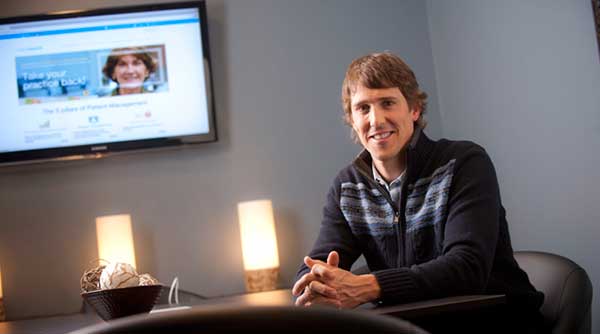More than anything else, it is fear that keeps many doctors from building the kinds of practices they really want to have. All-too-often, the fears are unfounded, says Jeff Gladd, MD, an integrative family physician in Ft. Wayne, IN.
In his own journey from restrictive conventional care models to creation of his now-thriving GladdMD practice, Dr. Gladd has had to confront many of his own deepest fears.
“The culture of medicine is one of not taking risks. We’re told that in order to survive we have to take insulated jobs as employees of hospital systems. We’re told that we can’t do it on our own. Everything is can’t, can’t, can’t. As high-achievers, we are unfamiliar with failure and we tend to distance ourselves from even the possibility of failure.”
Dr. Gladd, program chairman of Holistic Primary Care’s upcoming Heal Thy Practice 2013 conference, spends a portion of his time these days consulting with doctors who are in the early stages of transitioning into cash-pay integrative practice. He’s acutely aware of the extent to which fear gets in the way.
early stages of transitioning into cash-pay integrative practice. He’s acutely aware of the extent to which fear gets in the way.
Simple as a Lemonade Stand
Some clinicians are utterly intimidated by the very idea of “going into business for themselves.” They feel they have no business training, and their experience in insurance-based medicine has them convinced that the business of healthcare is far too complex to comprehend. The longer they stay employees, the more intimidating it becomes to even think about running their own practices.
While insurance-based medicine is ridiculously complicated, direct-pay is not.
“You don’t need an MBA to figure out the basics of how to run a cash-practice. It’s actually quite simple. If you step outside the insurance system, you get rid of all the coding and paperwork and bureaucracy. Medicine actually becomes very straightforward. My cash-pay practice is really not much more complicated than my daughter’s lemonade stand!”
In his work with physicians in transition, Dr. Gladd finds that the inhibitions people feel fall into three basic categories:
• Fear of failure
• Fear of getting in trouble
• Reluctance to address issues around self-worth.
While any transition has an element of risk, so does staying put in a practice model that does not support good care or provide a good living. Many fears that plague doctors contemplating transition are more imaginary than real.
Dr. Gladd, who’s been able to create a highly successful cash-pay integrative practice in “in the midst of a recession, in a town that’s ranked the dumbest city in the country,” offers the following remedies for fears around transition.
Tune in to Your Community’s Needs: “People everywhere are looking for holistic care. Big city, small town, suburb, it doesn’t matter. There are interested people all over. If you are able to able to provide good holistic care, capable of getting the word out, and you price your services to be affordable for most people in your region, odds are definitely in your favor,” he says. It is certainly easier to make care affordable if you can lower your overhead—and insurance-based medicine puts a LOT of overhead into doctors’ offices.
Start Small: Many clinicians believe the transition out of insurance must be a big, all-or-nothing move. This kind of thinking only feeds fear. In reality, it is possible to take small steps through which you transition gradually, at your own pace.
“You could start by designating one half-day per week to cash-pay holistic services while doing your conventional insurance practice for the rest of the week. As you get more comfortable, more engaged with holistic practice, and word spreads, you can increase the hours dedicated to this.”
Another option is to rent space from an acupuncturist, chiropractor or other well-established practitioner in your area, and begin a part-time holistic practice there. Many non-MD clinicians—and their patients–are eager to find open-minded MDs & DOs. Their patient referrals become the nucleus for a full-time holistic practice.
“You don’t’ have to start out with a massive business plan, or spend a fortune on some amazing new clinic space,” Dr. Gladd says. “You just need to get started.”
Connect with Like-Minded Peers: Isolation feeds fear, especially the fear of getting into trouble for stepping out of line. This stops many would-be holistic doctors before they even start.
Dr. Gladd says this fear is largely unfounded. The number of doctors practicing some form of holistic/functional medicine is increasing—even among those who still identify as mainstream. So is the number of physicians going cash-pay or concierge. The more you connect with others who practice outside conventional models, the more you realize that the vast majority are doing so without incurring any medicolegal, regulatory or disciplinary trouble.
He strongly advised attending conferences, joining organizations, and participating in online communities dedicated to alternative practice models. Peer support is a great antidote to fear. It also gives you insight on how others handle challenges you might be facing.
Recognize Your Worth: “Many doctors are uncomfortable talking about money. Nobody ever taught us how, and in truth, a lot of doctors have no idea what their services cost,” says Dr. Gladd. Insurance-based practice make it easy for both doctors and patients to avoid money discussions.
Direct-pay is a different story. it depends on recognizing and clearly defining your value. Dr. Gladd finds that patients really appreciate clarity on cost of care and what they can expect for their expenditure.
“If you’re honest and up-front about it, and you are truly dedicated to good care and your patients’ health, they will feel that and they will be grateful.”
Discomfort with money matters feeds some doctors’ fear that if they are direct about charges, too few patients will be willing to pay and the practice will fail.
The remedy for this is to build confidence in your clinical skills and your hard-won expertise, and to recognize that people pay out-of-pocket for high-value knowledge and skill all the time. “Think about it: people pay a lot of money for accountants or lawyers or other professionals with specialized knowledge. Why should health care be different?”
There’s no need to hard-sell in direct-pay, so long as you are truly motivated by wanting to provide the best possible care for your community. “People see through to your real motives. In reality, it’s the insurance-based clinics that are most worried about money. People feel that in the clinical interactions, and they don’t like it.”
Dr. Gladd says there are few–if any–downsides to direct-pay. It gives you a greater ability to focus on what patients really need, allows more personal and family time, invites creativity, and often opens new and unexpected opportunities.
“By running your own practice, you open yourself up to lots of other possibilities that come your way, and you won’t have to ask permission in order to take advantage of them.”
END








